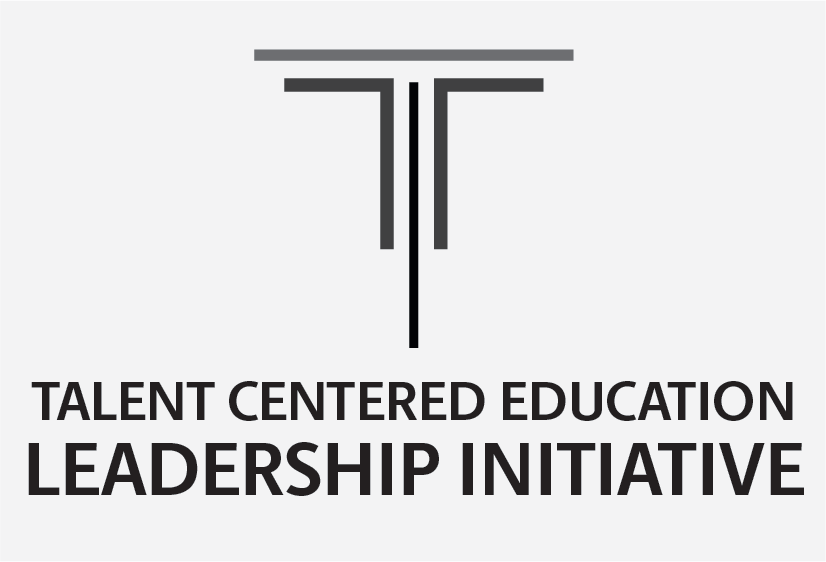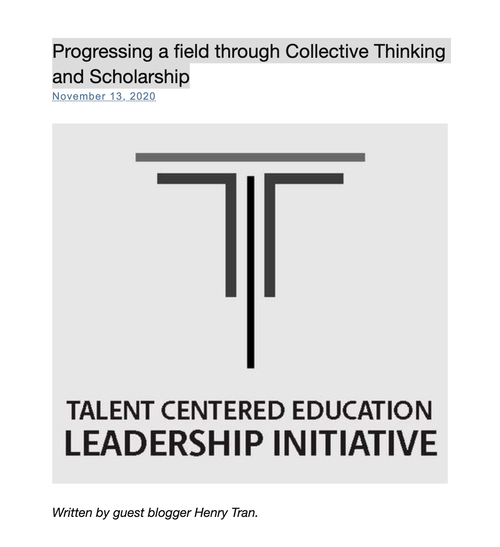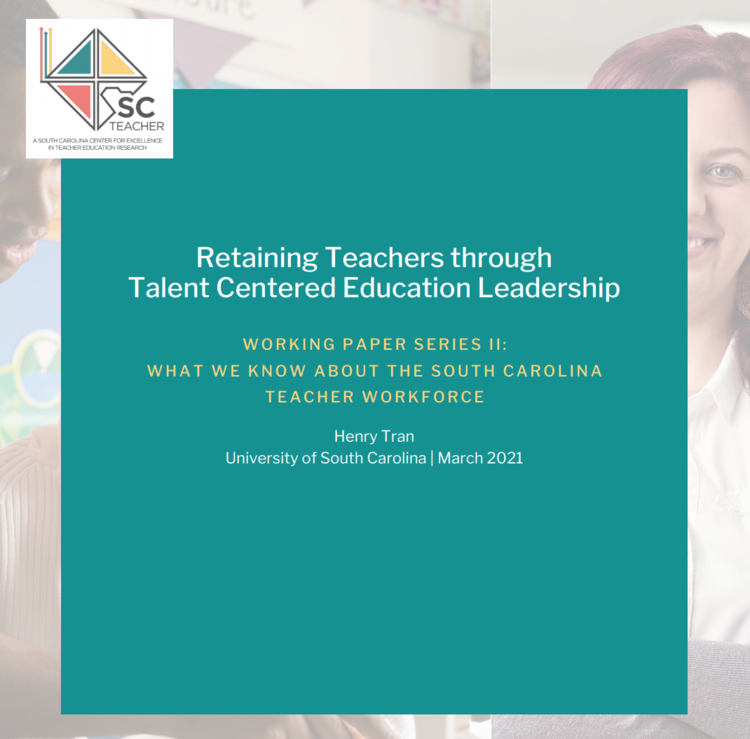Talent-Centered Education Leadership Initiative
ABOUT
Educators are the most direct academic influence on student learning outcomes, and some of the most pressing questions in education relate to their talent management. Inspired by a progressive, future-oriented strategic human resources management approach, the Talent Centered Education Leadership Initiative is based on the premise of emphasizing the needs of educators at the forefront of those endeavors.
Dr. Henry Tran (shown right) is the director of TCELI and is an assistant professor at the University of South Carolina.
Strategic Human Resources Management in Schools:
This book provides a new approach to human resources management, grounded in the perspectives of cutting-edge practice, research, and theory. Traditional human resource (HR) practices in education have operated in an isolated and reactionary manner; this book explores an updated version of personnel administration that links strategic human resources to organizational goals, educational mission, educator well-being, and student success.
Designed for aspiring leaders, this volume is grounded in the Professional Standards for Educational Leaders (PSEL) and National Educational Leadership Preparation (NELP) Building and District Level standards and is full of rich pedagogical features including cases, “warning boxes” to explore areas particularly thorny to navigate, questions for discussion, and various learning activities.
Leadership in Turbulent Times:
The second of two volumes, Leadership in Turbulent Times draws upon cutting-edge theories and evidence-based strategies by integrating conceptual and empirical work addressing educational leadership in these unprecedented and turbulent times, with a particular focus on cultivating diversity and inclusion in the higher education workplace.
Moving theory and practice towards real change.
Leadership in Turbulent Times:
The macro-societal events against social injustice that have occurred recently have brought increasing attention to the problems of inequality in society.
Moving theory and practice towards real change, Leadership in Turbulent Times is a timely contribution towards the goal of providing resources for promoting diversity and inclusion to leaders, educators, researchers, and policymakers within the field of Education.
CIHE and the Talent-Centered Education Leadership Initiative Presents:
A discussion about teacher recruitment and retention (focusing on the state of South Carolina) with a knowledgeable group of panelists Topic: Understanding Teacher Retention: Challenges and Solutions
CIHE and the Talent-Centered Education Leadership Initiative Presents:
A discussion about teacher recruitment and retention (focusing on the state of South Carolina) with a knowledgeable group of panelists Topic: Understanding Teacher Recruitment: Challenges and Solutions (Video is out now)
The Most Recent Efforts to Combat Teacher Shortages Don’t Address the Real Problems
The book, “How did we get here? The Decay of the Teaching Profession”, has just hit the press. This book is about the status of the teaching profession, and how it got to the point where we saw nationwide teacher walkouts (such as the infamous May 1st walkout in SC in 2019) and teacher shortages. While the topic speaks to a national trend, the book focuses on SC as a case example. Through each chapter, the book goes through various significant influences of and factors for the status of the teaching profession in SC including the civil rights responses of Black educators since the Reconstruction, district staffing responses to desegregation, teacher shortages undergirding the Abbeville vs. South Carolina lawsuit, The SC Rural Recruitment Initiative, teacher compensation, teacher working conditions across the decades, the role of the school principal, teacher activism and much more. There are also discussions on how to move forward.
Introduction to Talent-centered Education Leadership
Talent-centered Education Leadership: Diversity in Higher Education (Especially STEM)
South Carolina, a predominately rural state, suffers from severe teacher shortages. The state’s struggles, unfortunately, are not anomalous; rather, they are emblematic of a larger problem: teacher recruitment and retention in rural areas.
Progressing a Field Through Collective Thinking and Scholarship
The University of Toronto Press has published a blog post written by Dr. Henry Tran.
Center for Educational Partnership
The Center for Educational Partnerships' (CEP) mission is to provide educational extension services to schools, families and communities in South Carolina that facilitate collaboration among diverse education stakeholders, leverage existing resources and build local capacity to improve student achievement in South Carolina’s K-12 schools.
Growing Rural - A Podcast from SC Center for Rural and Primary Healthcare: The Director of the Talent Centered Education Leadership Initiative was invited to an interview with Dr. Kevin Bennett for Growing Rural: A Podcast from SC Center for Rural and Primary Healthcare (episode 9).
SEPTEMBER 2019 - UNDERSTANDING THE EDUCATOR SHORTAGE 2019
JEHR Special Issue: Gender and Race in the Education Workplace – Part 2
Dr. Henry Tran and Dr. Gaëtane Jean-Marie have co-authored a two-part special issue of JEHR, titled “Gender and Race in the Education Workplace.” The second part of this special is available now.
Education professors Henry Tran of the University of South Carolina and Douglas Smith of Iowa State University discussed efforts to address the national teacher shortage on Washington Journal with C-Span.
This is a video of Dr. Henry Tran’s AERA Division L Diversity committee talk about how systemic human capacity inequity is sustained for rural schools and communities. Rural educator shortages is only part of the story.
2021 AERA Annual Meeting Presidential Sessions
This session will involve an introduction to TCELI; three related presentations on: a) the importance of administrative respect for teacher retention, b) Black women in higher education leadership, and c) barriers to diversity and inclusion for STEM faculty; and conclude with a panel discussion with experts across the country on how to create more inclusive education work settings for people of all backgrounds across the P-20 continuum.
The Journal of Education Human Resources 38(3) has been published.
Second special issue of the Journal of Education Human Resources guest edited by Drs. Irina Okhremtchouk and Rosa Jimenez has been published!
Check out the inaugural issue of the Journal of Education Human Resources. The journal will debut with 3 exciting special issues for our “series premiere.” Read the first issue now.
Lawmakers are Solving the Wrong Problem in Teacher Shortage, Experts Say
“Authors argue we should be supporting the teachers we have, not making it easier to hire more.”
Part 2 of JEHR’s special issue discussing race and gender is out now.
Education professors Henry Tran of the University of South Carolina and Douglas Smith of Iowa State University discussed efforts to address the national teacher shortage on Washington Journal with C-Span.
Talent-centered Education Leadership: The Importance of Respect for Teacher Retention
Spotlight on Talent-centered Education Leadership: Creating More Inclusive Education Work Spaces
RURAL EDUCATOR TALENT MANAGEMENT SEMINAR EVENT 2019
“Given the severe educator recruitment and retention challenges facing many high poverty rural school districts, TCELI in collaboration with CIHE, The SC Education Policy Center and UofSC’s College of Education invited Drs. Ingersoll (University of Pennsylvania), Fuller (Penn State University), Pendola (Auburn University) and Goff (University of Wisconsin-Madison)…”
Retaining Teachers through Talent-Centered Education Leadership
“The COVID-19 pandemic of 2020 exacerbated pre-existing teacher staffing challenges across schools in the U.S., where escalating work-related uncertainty, stress, scrutiny, and safety concerns have resulted in elevated dissatisfaction with the education profession (Tran, Hardie & Cunningham, 2020). Even before the onset of COVID-19, the decline in enrollment in teacher education programs coupled with rising teacher turnover (CERRA, 2019) have resulted in what some are calling the “teacher shortage crisis” in South Carolina (Thomas, 2018) and across the nation (National Commission on Teaching and America’s Future, 2003). This report discusses why teacher shortages matter, the policy initiatives that have been employed in response, the salience of administrative support for teacher retention, and how a new paradigm in education human resources management – known as Talent Centered Education Leadership (TCEL) – can optimally leverage administrative support to its full capacity.”
JEHR Special Issue Call - Gender and Race in the Workplace
JEHR Special Issue Call – Intersection between Education School Funding and Human Resources: “Human resources (HR) decisions and policies are often influenced by the fiscal resources and decisions of the education institution (Flora, 2020; Jeffery, 2013; Roy, 2016). As organizations strive to maximize performance and increase outcomes…”
JANUARY 2020 - STAKEHOLDER ENGAGEMENT: IMPROVING EDUCATION THROUGH MULTI-LEVEL COMMUNITY RELATIONS (EDITED BY HENRY TRAN; DOUGLAS A. SMITH AND DAVID G. BUCKMAN)
This book focuses on the topic of the multiple stakeholders that comprise the education community across the P-20 continuum. In various ways and forms, the authors of the chapters found within this book promote the importance of engaging with a diverse array of stakeholders in order to truly improve education in an increasingly interconnected world. The book itself is divided…
OCTOBER 2017 - TALENT MANAGEMENT SYMPOSIUM































